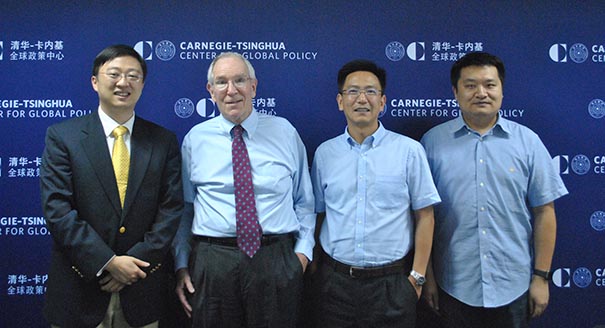Registration
You will receive an email confirming your registration.
The unexpected rise of anti-establishment candidate Donald Trump has polarized the Republican Party. Some Republicans say they will vote for the Democratic candidate Hillary Clinton in the November election, while others believe that Trump represents the party’s silent majority. Looking beyond the 2016 presidential election, what is the future of the Republican Party and how will it impact U.S. relations with China?
Carnegie–Tsinghua’s Zhang Chuanjie moderated a discussion with Chinese and international experts on how Donald Trump’s rise has changed the Republican Party and what the future may hold. The conversation sought to provide insight on the ways in which the 2016 presidential election will impact U.S.-China relations moving forward.
Discussion Highlights
- Rise of an Unconventional Candidate: Donald Trump’s popularity can be attributed to the support of blue collar workers, one panelist argued. The working class believes his remarks paint him as an honest man and appreciates that he isn’t part of the Republican establishment. The real estate mogul has a strong appeal to those who have suffered from economic globalization, who are largely less-educated, older white men living in the South, the Rust Belt, and the Rocky Mountains, a panelist said. His supporters have lost out to global competition, particularly from China, suffered from wage and job losses, and feel threatened by terrorism, immigrants, and America’s changing demographics. The panelist noted that these voters have real reasons to be angry, and Trump represents a way forward.
- Deeper Rifts in the Republican Party: Trump’s candidacy, and his appeal with voters, has revealed a chasm in the party that goes beyond the fight between the Tea Party and established Republicans over the past few elections. While previous candidates had to cater to activists and big-money donors to fund their campaigns, one panelist pointed to Trump’s independent wealth that has allowed him to diverge from the usual Republican rhetoric advocating for social conservatism and free trade. Donors and activists still trumpet these principles as cornerstones of the party, but the average Republican has turned against these principles and is in favor of more protectionism for American companies and is also more socially diverse.
- Limited Playing Field: The 2016 presidential election has differed from previous ones mainly in the fact that both candidates are disliked by both Republicans and Democrats. One panelist pointed to a survey that shows Hillary Clinton and Trump are the most disliked candidates to run for office since 1980. The public’s apathy toward Clinton, and the former first lady’s media coverage over her 30 years in the public eye, a panelist argued, has created a negative storyline of the candidate. Critics lambast her for not conveying warmth and criticize her close connections to the wealthy and the elite.
- China’s Stake in the Election: While many Chinese have voiced their admiration of Trump for his bravado and have compared him to Russian President Vladimir Putin, one panelist said China would be better served by a Clinton presidency. A critique of the Republican candidate is that no one knows what Trump thinks about policy issues given his ever-changing stances, but Clinton, the panelist argued, is a steady and predictable figure. She would likely continue to advocate for U.S.-China policies similar to those pushed for by President Barack Obama’s administration, such as freedom of navigation in the South China Sea, but Chinese officials would know what to expect.
- Looking Beyond 2016: Both the Democrat and Republican parties will need to change after 2016 if they are to continue garnering the support of the general public, panelists said. A disconnect has emerged between what the parties’ donors and what the average American believes in. Moreover, evangelicals, defense hawks, libertarians, and pro-wealthy conservatives can no longer coexist as they once did, panelists said. If the Republican Party is to survive post-Trump, it will need to cater to the masses who have brought Trump to the forefront of this election.
Zhang Chuanjie
Zhang Chuanjie is a resident scholar at the Carnegie–Tsinghua Center for Global Policy. His research interests include U.S.-China relations and public opinion analysis.
Benjamin Page
Benjamin Page is the Gordon S. Fulcher professor of decision making at Northwestern University. His research focuses on American politics and U.S. foreign policy.
Diao Daming
Diao Daming is an assistant researcher at the Institute of American Studies at the Chinese Academy of Social Sciences where he focuses on the United States Congress and its role in U.S.-China policy making.
Xie Tao
Xie Tao is a professor of political science at Beijing Foreign Studies University who specializes in U.S.-China relations.
